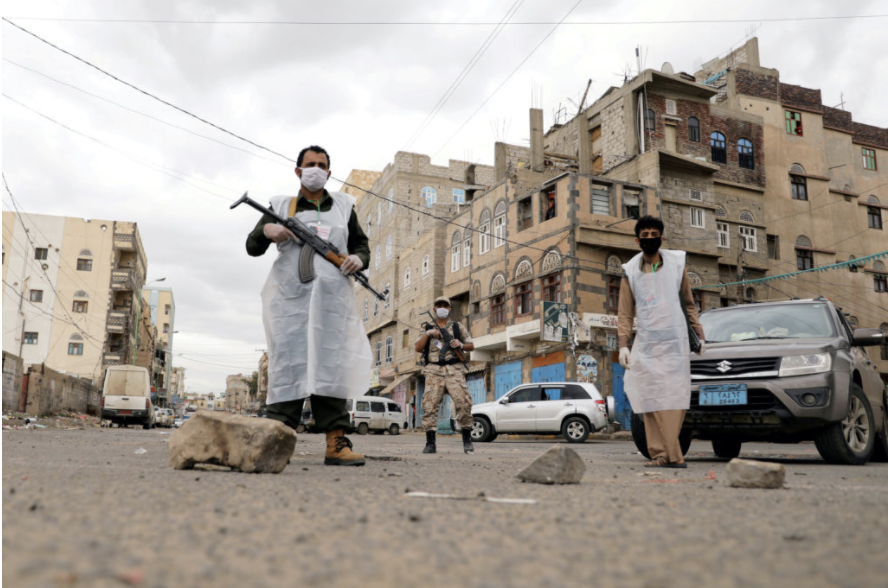Crisis in Yemen: In the Midst of COVID-19 and a War
A WAR ON TWO FRONTS: Armed men wear masks to patrol the streets of Sanaa, Yemen, during a 24-hour curfew, as concerns regarding COVID-19 grow.
June 29, 2020
After the cease-fire declaration from Saudi Arabia caused by COVID-19 ended in May, violence continues in Yemen. As the pandemic pushes the country’s health system to its limit, Yemen continues to be the largest humanitarian crisis in the world, with its civilians suffering from illness and famine.
Currently, there have been fewer than 300 COVID-19 deaths officially reported in Yemen. However, with limited COVID-19 testing, officials are unable to keep an accurate record of how many civilians suffer from the pandemic daily.
“The worst-case scenario — which is the one we’re facing now — means that the death toll from the virus could exceed the combined toll of war, disease and hunger over the last five years [in Yemen],” United Nations (UN) Resident and Humanitarian Coordinator in Yemen Lise Grande said to CNN.
According to a UN-commissioned report from the University of Denver, that number could exceed 230,000 deaths.
Earlier in June, international donors were able to raise $1.35 billion, although the goal was to raise about $2.4 billion, the amount of funding needed to cover essential aid in Yemen. Without enough funding, UN Chief Antonio Guterres explained 30 out of 41 major UN programs in Yemen may have to close in the coming weeks.
“General health services in 189 of the country’s 369 hospitals start to close in three weeks,” Grande said. “Water and sanitation services for 8.5 million people, including 3 million children, close in three weeks. Nutrition support for 2.5 million malnourished starving children will start to close in eight to 10 weeks.”
According to the UN, about 80% of the people in Yemen require aid because they are homeless, malnourished or ill from cholera and dengue fever. And 24 million people need life-saving aid, which covers water, food and medical treatment.
Charity organizations such as the Catholic Agency For Overseas Development (CAFOD) continue to provide emergency funding to the most vulnerable families who cannot afford food. However, a CAFOD partner agency explained how basic foods are no longer accessible, as the prices for food rose heavily due to the inflation from the pandemic’s economic shock.
However, the pandemic is only one of Yemen’s numerous concerns, including the six year long conflict with the Houthis, an Islamic movement from northern Yemen supported by Iran, beginning in 2014 after they took control of Yemen’s capital of Sanaa.
Saudi Arabia’s bombing campaign, as well as the Houthis’ efforts to prevent international aid throughout these last couple of years, has caused the suffering of millions of innocent civilians in Yemen.
Since April, another war in Yemen has begun. Instead of fighting the Houthis together as a Saudi-led coalition, southern separatist groups in the militias began fighting against government troops in hopes of gaining their independence from northern Yemen once again.
Violence erupted between both groups when the Southern Transitional Council, a group of the southern separatists backed by the United Arab Emirates, declared self-rule over the key port city of Aden and other southern provinces back in April.
Despite the increasing violence, peace deals and cease-fire agreements have continued to fail. The U.S. also contributed to this failure by blocking a UN Security Council resolution that called for a global cease-fire to help mitigate the impacts of COVID-19.
During the years of war in Yemen, the U.S. firms have gained billions of dollars from selling weapons and intelligence to Saudi Arabia.
“The country cannot deal with ongoing fighting and…a health crisis of this magnitude,” spokesperson for British charity Oxfam, a major provider of aid on the ground in Yemen, Samah Hadid, said. “So, instead of hindering peace processes and peace talks, a government like the U.S. needs to actually back the calls for a cease-fire and back efforts for warring sides to actually come together and actually commit to containing this virus.”
According to a Saudi-led military coalition, last Monday, Yemen’s government and southern separatist forces agreed on a ceasefire and will begin talks on implementing a peace deal.
“The Coalition calls on all Yemeni political, social and media components and powers to support the parties’ response to convene a meeting in Riyadh, and work diligently to implement the Agreement,” a statement from the Saudi-led coalition said.
With limited funding and a lack of COVID-19-related supplies, the people of Yemen remain vulnerable to the pandemic, famine and war conflicts. If there is no change accomplished in the near future, it is likely they will be forced to fight an even steeper uphill battle.
To support Yemen, donations can be made through UNICEF, a humanitarian aid organization, or through other organizations such as the World Food Programme, which specifically addresses hunger and food security.



![AAAAAND ANOTHER THING: [CENSORED] [REDACTED] [BABY SCREAMING] [SIRENS] [SILENCE].](https://thehowleronline.org/wp-content/uploads/2025/06/lucy-1200x800.jpg)





















































![AAAAAND ANOTHER THING: [CENSORED] [REDACTED] [BABY SCREAMING] [SIRENS] [SILENCE].](https://thehowleronline.org/wp-content/uploads/2025/06/lucy-300x200.jpg)